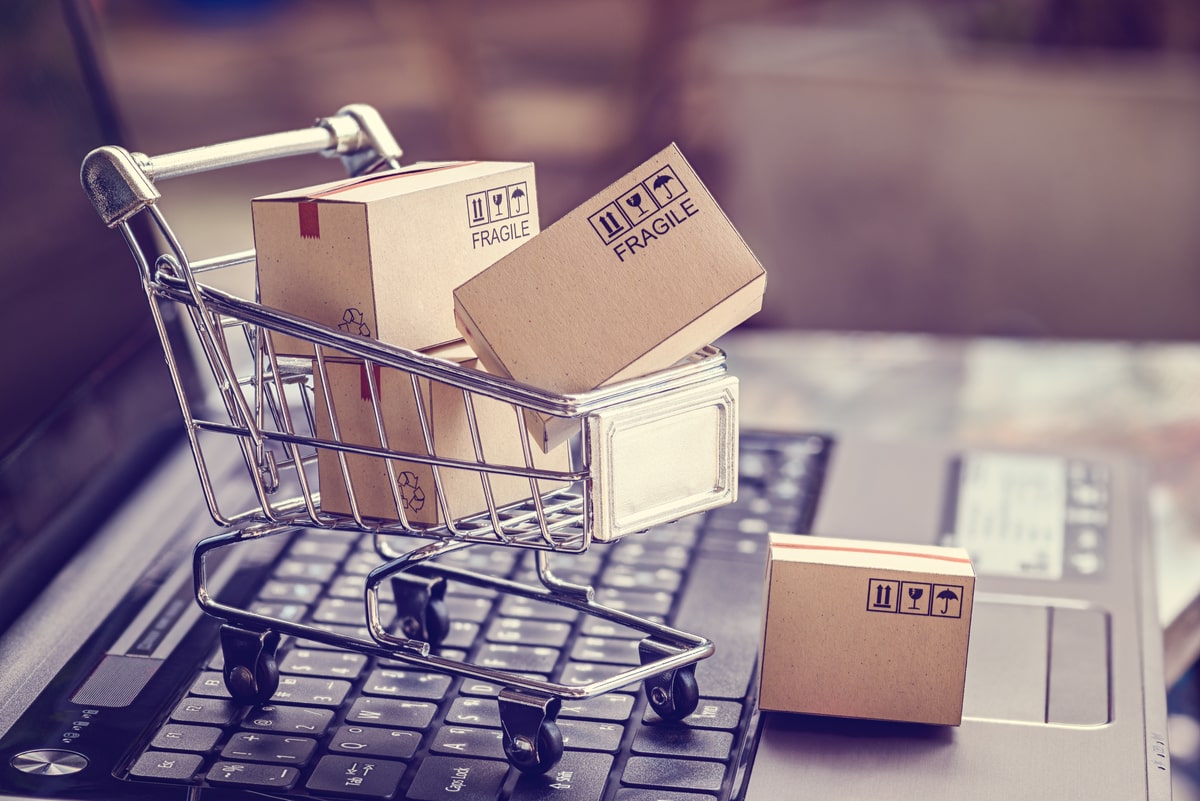Starting an online store may seem like a daunting task, and you may not know where to begin. Designing a site logo, choosing a name, and deciding what product to sell can easily become overwhelming. Not to mention, the pricing of your product, marketing, and advertising expenses that come with it. For a more organized and detailed approach, follow the guide below on how to start an online store to ensure you are making the correct steps toward opening your business.

Choose the Right Platform
Once you have an idea of what you want to sell, use a hosted e-commerce platform to create and host your own site with open-source, e-commerce marketing and software, or on a third-party platform.
- Hosted e-commerce platforms: You can use website templates and tools to create your site. Sites such as Squarespace or BigCommerce are popular and are used to establish a strong online presence.
- Open-source, e-commerce software: If you are good with computers, you can build your own site. You will have more freedom to create your own look and layout and utilize different features available on hosted sites. You will be in charge of security updates and website maintenance, and performance.
- Third-party e-commerce marketplaces: Places like Amazon and Etsy let you sell products through them. You may get more viewers of your product, but you will lack the chance to brand yourself through your own personal website.
Calculate the Costs
One of the perks of e-commerce is the low cost of creating it. However, this doesn’t mean you will be paying anything. There are costs when starting an online store, such as paying for the product you are selling, as well as domain fees and commissions for selling on third-party websites. Add that to business expenses such as marketing and packaging costs, and things will begin to add up.

Here are the main expenses to take into consideration when starting an online store:
Permits and licensing
Permits and licenses do not only apply to physical storefronts. You may be required to register for a sales tax or have a food permit in case you are selling baked goods. The requirements vary by state, so be sure to do your research beforehand.
Equipment and Maintenance
Depending on what you want to use, the equipment can be one of the most expensive items on your online startup checklist. Outside of the tools you will be using, you need laptops, routers, and other technology to keep your business afloat. You may also need to pay to have your equipment maintained regularly.
Domain Hosting and Email
You will need a hosting plan, no matter how you choose to design and build your website. Inexpensive plans are good for small business owners and those who are just starting their first business.
Software and Platforms
E-commerce platforms are there to help you build your site, but they will come with fees and subscription costs. Software is not cheap either, but you may require it to keep track of your finances and manage projects with your team.
Transactional Costs
Your day-to-day expenses for your business will begin to add up if you don’t manage your finances. Keep track of how much you spend and where your money goes so you can account for every penny. It is wise to automate business expense tracking and reporting as often, small mistakes in financial reporting can bring huge fines and unpleasant tax audits!
Insurance
You will need many types of insurance to keep your business protected, such as general liability insurance, product liability insurance, and potentially business interruption insurance. These can add up to thousands of dollars in expenses to your business model.
Factor in Shipping Details
Shipping is not cheap, and the more customers and sales you have, the more you have to pay to ship out your products. Or, you can increase the cost of your products to offset the shipping cost. It depends on what is the best option for you financially. If you are shipping internationally, you will have to deal with customs forms, exchange rates, and higher shipping costs.

Know Your Product
Before you figure out what you want to sell, educate yourself about your product before starting an online store. Become an expert so that customers want to do business with you. You can even have a blog page set up on your website that answers any questions your customers might have.
Reach Out to Your Customers
Marketing and advertising your business is vital if you want to build an economical website and establish a strong relationship with your customers.
You can get started by developing a social media presence to gravitate attention to your product or service. Create a new Instagram or Twitter page for your business, as well as a Facebook.
The more you put yourself and your business out there, the more people will know about it. According to Josh Gordon, StoreYourBoard’s founder and president, asking for your customers’ opinions and reviews on your product will benefit you greatly in the long run. “All of it takes a lot of time and thought, but the results are a feedback loop that makes finding the right product even easier for future customers,” says Gordon.

Consider Alternative Monetization Strategies
If your website generates a decent amount of traffic, then you might be able to sell some of those customers to interested buyers using a lead distribution platform. For instance, if you are selling golf clubs, you might host affiliate links for other golfing products and services that you don’t sell yourself.
Figuring out every possible way to monetize your customers is essential for businesses just starting out. Every customer that hits your site during the first year will have a huge marketing cost since you basically invested everything so far into getting them there. Partner with whoever you can to help you monetize that customer.
How to Increase Online Sales
One of the best ways to increase sales and drive traffic to your online store is by creating a strong brand name for yourself and expanding your business outside of just your web front. Use social media tools to promote and sell your products and tell your friends and family about your new business venture. Word of mouth will help you gain more customers and increase online sales at a more consistent rate.

According to Quicksprout, here is how you can create a successful e-commerce website:
Pick a Marketing Strategy
-
- Find a logo
- Create a marketing plan
- Learn about SEO and how to implement it
Find The Right Audience For Your Product
-
- Who do you want to target?
- Who do you want to buy your product?
- Avoid picking a category that is too specific
- Keep the price of the product moderate
- Make sure there is a demand for your product
Choose a Name For Your Brand
-
- Easy to spell – You don’t want someone searching hours for your business
- Three words or fewer
- Make sure you can get the domain name for your product
- Relevant to your category – Make sure the name has something to do with your product; otherwise, it may not make sense
- No trademark conflicts – You do not want to have any legal issues with your product name
Create Your Online Store
-
- There are several tools, such as Shopify, Bigcommerce, and Wix, which help you create your online store. They are packed with features and customizable tools to develop the web presence you want for your services. WordPress is another popular platform for site-building, though its features can be a bit trickier to navigate. Explore your options and see what you like the most.
Best E-commerce Platforms
According to WebsiteBuilderExpert, here are the top e-commerce platforms for building your site.
- Wix – best all-around e-commerce platform
- Shopify – best e-commerce platform for large stores, selling 10+ products
- BigCommerce – best for large and fast-growing businesses
- Squarespace – best for high-quality templates and aesthetic storefronts
- Square Online – best value for money
- Weebly – the one to watch
- Volusion – excellent analytics features.
- GoDaddy – best for beginners
Wix seems to be the best option overall. The site breaks it down based on cost, convenience, and level of web experience. It also breaks down the sites by their features and notes which ones are most important to focus on.
- Ease of Use – You want something simple to navigate and easy to use
- Sales Features – Includes image galleries, contact forms, and calendars
- Website Features – Email marketing, SEO, blogging
- Design Functionalities – Branding, design, UX (user experience), UI (user interface)
- Value for Money & Cheapest – Does the platform offer everything you need at the right price?
- Help and Support – Customer service, phone line, live chat

While this might all seem overwhelming at first, starting an online store is not an easy task, and the proper research needs to be done before you choose how and where to start. Following these rules and guidelines will help you develop a better understanding of what to expect and how to move forward with your online business venture. Above all, remember to enjoy the experience and have fun; opening your first online store is a great feat!


